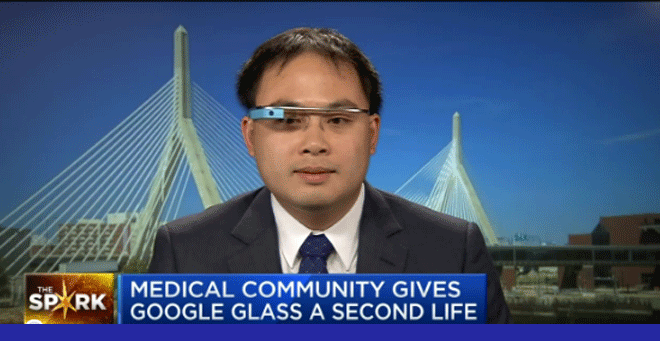 |
Google Glass can be an effective tool to bring “virtual specialists” to emergency department patients, according to a CNBC interview with Peter R. Chai, MD, assistant professor of emergency medicine.
“We are using Google Glass in our hospital to really beam our virtual specialists down to us in the emergency department so that we’re able to have specialists see people at the bedside without really being there by wearing a simple, head-mounted device,” Dr. Chai said in a CNBC’s “The Spark” segment on Friday, July 1, explaining a recent study involving the device. “As an emergency medical physician, one of the things we’re always interested in is how we can get specialists to the bedside faster to improve the care that we render to patients.”
Advances in wireless infrastructure, the miniaturization of hardware and the advent of wearable devices such as Google Glass allow a new generation of technologies that can assist physicians and improve health care delivery to be deployed in clinical settings. In a study co-authored by Chai and published last August in the Journal of Medical Toxicology, emergency medicine residents at UMass Memorial Medical Center performed 18 toxicology consults with Google Glass. ER physicians wearing Google Glass evaluated the patients at bedside while a secure video feed was sent to the toxicology supervising consultant. The supervising consultant then guided the resident through text messages displayed on the Glass. Consultants also obtained static photos of medication bottles, electrocardiograms (EKG) and other pertinent information at the discretion of the supervisor. This was done in addition to the standard verbal consult available to residents.
Consulting toxicologists reported being more confident in diagnosing poisonings using Google Glass. Additional data collected showed that the use of Google Glass also changed management of patient care in more than half of the cases seen. Specifically, six of those patients received antidotes they otherwise would not have. Overall, 89 percent of the cases seen with Glass were considered successful by the consulting toxicologist.
Watch the full CNBC video with Chai: CNBC: Comeback for Google Glass?
Related story on UMassMedNow:
Telegram reports on UMMS research into using Google Glass in the ER